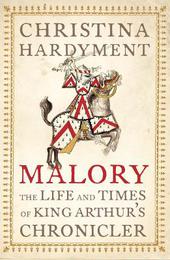
|
Malory: The Life and Times of King Arthur's Chronicler
Paperback / softback
Main Details
Description
The extaordinary life of Sir Thomas Malory, author of the 'Morte d'Arthur'. Sir Thomas Malory's 'Morte d'Arthur' (1469) is one of the best-known books in the world. Virtually all modern versions of the Arthurian legends are derived from its energetic, memorably phrased and remarkably individual telling of the stirring exploits of King Arthur and his Knights of the Round Table. Yet the identity of the 15h-century knight who wrote it has remained an enigma for centuries. Only in the last few years has it become possible to construct a convincing life story for him. His life was constantly eventful, marked by great achievement, desperate situations and, at times, deep disgrace. He was an experienced soldier, a star performer at tournaments, a connoisseur of literature, connected to the great and the good, yet he also escaped from prison twice, and was accused of terrible crimes ranging from assault and cattle-rustling to attacks on abbeys and even rape. The foremost chronicler of the legends of the Knights of the Round Table almost certainly wrote much of his great work while imprisoned. Christina Hardyment writes his life story whilst also writing a social history of a fascinating period of English history, an age that marked the high-water mark of medieval chivalry but which was also an essential bridge from the Middle Ages to modern. The book is well furnished with details of clothes, food and domestic interiors, to say nothing of hunting, falconry and jousting techniques, and is a sumptuous work that fleshes out the man and the period in glorious detail. An entertaining book, guided by academic rigour in its scholarship and research.
Author Biography
Christina Hardyment read history at Cambridge and held the Alistair Horne Writing Fellowship for historians at St Antony's College, where she is now a Senior Associate Member. Her books in the field of literary biography include Arthur Ransome and Captain Flint's Trunk (a companion to the places, people and boats in Arthur Ransome's Swallows and Amazons stories), Heidi's Alp (a tour of the European places connected with children's stories) and Literary Trails: Writers in the Landscapes. She has four daughters and lives in Oxford.
Reviews'How refreshing to read a biography which is actually on the side of its subject ! Of the many remarkable feats accomplished in this book, the greatest is the desire it provokes to read Malory's masterpiece again ! lively and readable ! Christina Hardyment has done the memory of earnest, erring, passionate Sir Thomas Malory a huge service.' Independent on Sunday 'This is a book which any reader interested in the middle ages should try for themselves.' Guardian 'Hardyment's excellent biography, is like the "Morte Darthur", a text for its times.' Independent 'Meticulous ! ingenious ! vividly portrayed ! Christina Hardyment's book is a persuasive attempt to rehabilitate a tarnished icon.' Daily Telegraph 'Hardyment's imagination is certainly vivid. Her description of Malory's christening is a memorable performance, with flaming torches, flickering candles, the superstitious placing of a crust of bread under the baby's mattress to keep witches away ! Such theatricality is well suited to the period ! This biography does remind us of the marvels of Malory's book ! The power of Malory's storytelling beats through Hardyment's account of the life.' New Statesman
|